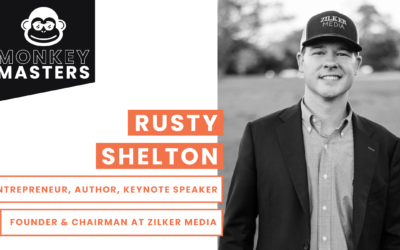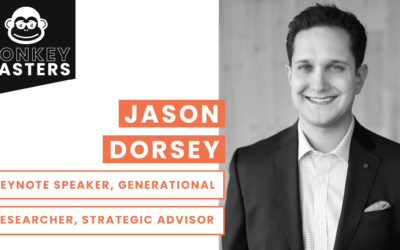Five lessons on how mentors can help you keep moving forward on your entrepreneurial journey.
When I meet a prospective entrepreneur I have one very simple question that tells me everything I need to know. You might be surprised because it has nothing to do with business plans, strategy, market size or even future aspirations. Of course I want to know about these things, but my real “make or break” question is simple.
“Can you tell me what mentors you have now – and how you lean on these relationships to help solve any key problem you are facing?”
Why this question? Well, it really comes down to dealing with The Monster Under the Bed, which I’ll just call The Monster from now on.
When you’re an entrepreneur, The Monster shows up more often than not – and usually when you are least prepared to deal with the beast. What, exactly, am I talking about here?
I used The Monster image for what can otherwise be called “oh fuck” moments that really make you question if you, as the fearless leader, actually know what the hell you’re doing in your job.
I am not talking about the daily grind that is the entrepreneur’s journey, nor am I referring to the fact that the journey never gets easy – we all know that the ups and downs just keep coming.
Rather, The Monster represents those rock-you-to-your-core moments that can only be fully experienced in the moment. It could be a loss of a major customer, a new unexpected competitor, the departure of a key executive, or an unfortunate series of poor judgment calls that makes you doubt your own capabilities to be running the show.
And, let me be clear: if you are an entrepreneur and you claim that you have never had one of these moments – then you are either delusional or full of shit…or both.
I have had more of these moments than I can count and it is *not* a pretty mental space to occupy. Not only is the issue real, but it’s in this moment that the loneliness of the job is omnipresent. Your options are pretty limited as to where to get input – do you call your board? How about your team? Maybe go home and talk to your partner? Sure, Mom will take your call and tell you she loves you – but can she help you find a new head of sales?
Mentorship and Monster Slaying
As an entrepreneur, you must push forward and keep charging even when The Monster is breathing really loud and you swear he’s sleeping under your bed. So this isn’t about courage, motivation or sticking to your guns.
Rather, this is about getting advice from someone who not only knows you but also knows enough about the subject matter in question…AND who also has the wherewithal to give you OBJECTIVE advice.
Every great entrepreneur needs a mentor. It is that simple. That’s why I ask this ONE question. Recognition of this need is the first step. Finding a group of great mentors is another step. The third step is using your mentors to help you slay The (fucking) Monster, regain your courage, and go back to building your amazing business.
Here are the five lessons I learned about mentorship during my entrepreneurial journey.
Lesson #1: Don’t go it alone – just about every great entrepreneur has a mentor.
Whenever you read about the great ones, the story is always told after the fact and when the genius of the entrepreneur is obvious. Gates, Jobs, Benioff, Schultz – amazing entrepreneurs – undoubtedly faced The Monster at some point on their journey. But the story that often isn’t told is that each of the really great ones has relied on some form of mentorship to help them fight whatever form their personal demon took. If you want proof, here’s a great photo journal of many more examples of entrepreneurs and their mentors.
The point is simple: if the best of the best of best rely on the power of mentorship, why wouldn’t you? Mentors can help you in a variety of ways, and there is no one-size-fits-all. A good relationship with a mentor will also be bidirectional, meaning that both the mentor and the mentee benefit from the relationship. Inc. Magazine published a good short interview with Daymond John of Shark Tank, who explains why all entrepreneurs – even him – need mentors to educate them on everything from fashion trends to acquiring digital skills.
“Technology is moving so fast, and it’s so vast, that having a mentor and someone who’s teaching you the fundamentals – where things are going and how to move accurately and spend your time – is essential.”
Lesson #2: Asking for help isn’t a sign of weakness; it is a sign of strength.
I can remember one of my biggest challenges as an entrepreneur when I was struggling to find an exceptional sales leader even though my business was in hyper growth mode. At one particular dark moment, after the *fourth* straight VP of Sales didn’t work out, I was at my wits’ end and was starting to question my own judgment and capabilities as a CEO. I really didn’t know what to do. It was at this very dark moment that I had lunch with one of my mentors, the former CEO of Veritas, Mark Leslie. I got to know Mark back in my banking days and had nurtured a relationship with him for several years, keeping in touch with him and updating him on my progress running ServiceSource.
I knew Mark was teaching a course at Stanford and it was focused on what he was calling The Sales Learning Curve – basically helping MBA students get prepared for managing the sales function.
But now came the hard part. Even though I knew Mark and was in somewhat regular contact with him, the only real way I was going to get what I needed was to have the courage to admit I was screwing up in my job, admit the mistakes I was making and ask for his help.
When I sought his input, I was open about the problems I was facing, the self-doubt I was feeling and the issues that I was wrestling with in detail. I left nothing out and openly admitted my mistakes. Why? Because with a mentor you *CAN* do just that – this should be a judgment-free relationship (different than your Board, by the way) – and that’s what makes it work. I will tell you more about Mark’s specific advice to me in a future post – or see his post here on mentorship – but suffice to say he is a real expert in this area. It was game changing for me and my business.
Lesson #3: Having one mentor is good. Having half a dozen is better.
I recently compiled a list of individuals whom I would consider to be my mentors – great leaders I could comfortably call upon to run an idea, question or strategic consideration by and expect both a prompt and thorough response. Not only was this a great exercise for me to express my gratitude, but it also showed me just how diverse and deep my mentor circle has become.
When I reviewed the list another point jumped out at me. There is a time component (based on relevancy of your journey) – and your mentorship circle should evolve as your business and personal needs change.
For example, when I was first getting started, it was critical for me to get advice from those who were highly engaged in startups and all the key issues that getting a business off the ground entails.
However, when my company was a more mature, public company and I was working to shift my business model, it incredibly helpful to be able to grab time with my friend Shantanu Narayen (CEO of Adobe) about what works and doesn’t when undertaking this strategic shift.
I think Reid Hoffman described it best in a recent interview:
“I think people think it’s convenient when I say my network is my mentor,” the Greylock Partners investor told attendees at Startup Grind’s annual international conference in Mountain View on Tuesday. That’s because they think he is just touting the kind of professional networking offered through LinkedIn, which he co-founded. “I’m not doing that actually,” Hoffman said. “What I find is I have had mentors for different aspects of my development.”
The key point is twofold. First, you don’t need one mentor, you need several, as Reid points out above. Second, your needs (like any other relationship) will evolve, so mentorship is an active not a passive exercise.
Lesson #4: Getting good mentors takes networking and self-awareness.
Here is a great quote from Sir Richard Branson’s the topic of mentoring:
“Mentoring was very important for me personally. For example, Sir Freddie Laker gave me invaluable advice and guidance as we set up Virgin Atlantic, while my mum has been a mentor throughout my life. Nowadays, I find mentors inside and outside of Virgin every day. If you ask any successful businessperson, they will always have had a great mentor at some point along the road. If you want success then it takes hard work, hard work and more hard work. But it also takes a little help along the way. If you are determined and enthusiastic then people will support you.”
I love his point of view, but what really jumped out for me was the last line. As an entrepreneur, if you show up with a strong will to win and high level of commitment, this attitude will be contagious. I have found that when I am enthusiastic, it is obvious and it opens a lot of doors because people are drawn to this enthusiasm and willing to help. This is the first step to attracting great mentors who want to help you.
The second step comes to self-awareness and networking. By being self-aware, I can be open to what issues I am facing AND be on the lookout for people who can help me. When I do this, I show up differently and repeatedly find myself connecting with great mentors without consciously seeking them out.
It is like when you buy a new car. Ever notice that the day after you buy a new Jeep, how many *other* cool people are also driving a Jeep? Did the population of Jeep owners suddenly increase due to your new purchase? How many followers do you have on Twitter?? Or is it that your self-awareness around the coolness of Jeeps that just skyrocketed?
So it goes with mentorship. By being enthusiastic, self-aware and open to networking, you will be amazed at how many mutually beneficial relationships will materialize. If you want more tactics on finding mentors, here’s a great Fortune article on How to Find and Use a Mentor.
So, that brings me back to my original question, and why it’s so crucial.
Lesson #5: The Monster will only win if you let it. Don’t let it.

To be a great entrepreneur and leader, it takes courage, confidence and a willingness to do what others have not been able to do in the past. This is all good stuff.
However, if you have these traits BUT DON’T have self-awareness and the willingness to ask for help, I would wager that your proclivity for success is low. It might sound counterintuitive in some ways. And it definitely shatters the myth that everything the entrepreneur touches automatically turns to gold. But sometimes being the hero really does mean asking for help – because that’s the most foolproof, expedient way of moving from point A to point B.
Being a great entrepreneur really means finding the most efficient way to get your goals accomplished – and just about everything you are trying to do has been done by someone before you.
Reid Hoffman put it well when he said:
“As entrepreneurs we are confident. We like to think we can figure things out for ourselves. But seek out intelligence. That’s really important. It’s far less costly to get intelligence in a 15- to 30-minute conversation than to spend a couple months doing something and realize that was the wrong thing to do.”
Your ability to find that someone (self-awareness), develop a relationship (network) and learn (copy) from them will help you get the results you want in a much shorter timeframe than doing it yourself.
The key is to see mentorship, advice and input as a sign of strength. It is the weak leader who believe he needs to do it all himself.


